
Resources
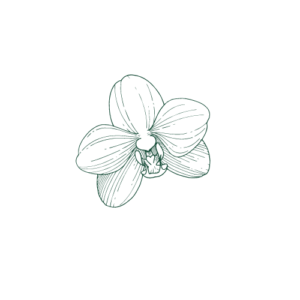
A little amplification on the benefits of Thai Coconut Coir and the specific advantages of the Thai Coconut Shell Propagation Box.
While we tend to focus primarily on the benefits to using the Thai Coconut Shell Propagation Box on cultivating prize-winning orchids, the byproducts from coconut husks have been used by gardeners for decades. However, what we get a sense from our international customers that many people are still not familiar with the advantages of coconut-derived growing materials. The process of husking the fibrous portion of the coconut, known as coco coir, dates to the 1980s. Back then, commercial flower growers in the USA found coconut coir allowed the roots of roses and other flowering plants to thrive. Since then, gardening with coconut husk products has grown in popularity.
As stated in our PRODUCTS page, there are many products marketed as “authentic” Coconut Coir in the form of chips, strips, bricks, or shredded mulch using some / several species of coconuts. In the modern consumer market, the outer shell of coconut fruit or coconut husk is used to produce several important products. It is used to make coco husk chips, coco peat, coir fiber, and coco crush. Our Thai nursey partners truly believe it is the best natural organic growing medium in the world.
From potting seedlings to growing magnificent gardens, the Thai coconut husk is used in all applications of growing plants and flowers. It is a raw material mainstay for greenhouse production. Coconut husk can give a growth boost to the plant and help them absorb nutrition more effectively and provides fantastic soil enrichment to the plants by decomposing over time.
Additionally, for flowers like roses, orchids, and anthurium, coconut husks are used in Thailand as the primary and most common plant growing medium. It is also used for the cultivation of several vegetables as well. Bottom line: it has monumental capacity to help grow plants by keeping the moisture inside.
However, in the case of our Thai orchid famers, it is the Thai Coconut Shell Propagation Box, with its raw coir husk attached to the inner shell skin, which makes it the most widely popular and most preferred medium for propagating and growing orchids.
The Orchidtect staff has comprised a list of the most notable attributes of using Thai Coconut Shell Propogation Box and look for the detailed video in the page.
Advantages of using the Thai Coconut Shell Propogation Box coconut husk as a potting medium as pot liner staves or the entire block of the Thai Coconut Shell Propogation Box:
- 1. Supply of adequate moisture to the plant
- 2. It will soak up water and prevents water retention
- 3. Balance Minerals
- 4. Maintain good tempature for plant
- 5. Maintain good temperature for plant
- 6. Reduce fungal growth in plant
- 7. 100% natural production (easily recyclable)
- 8. Eco-friendly
Video Resources
THE BEST POT LINERS FOR ANY POTTING MEDIUM
"Prefab Coco coir" versus "Raw pithy coconut husk shells"
Online shopping centers such as Amazon are full of prefab coconut fiber liners that you can buy for your hanging pots. if all you are interested in is for your pots to retain some extra water, the " Prefab coco coir" option can work very well. They provide good drainage and porous for sufficient aeration. Prefab coco coir pot liners also come in a variety of shapes and sizes and are manufactured using the rougher inner coir that is seperated and then soaked for days in water to extract the fibers which are then dried, and machine woven into matting and ultimately formed to assorted shapes and specific lengths. They do look cool cosmetically, and fit lots of pot styles and contours.
Examining both pot liners from this perspective, both accomplish the following:
Water Retention
One of the main reasons why both the prefab and the natural raw coconut coir husk makes for such a great growing medium is its natural ability to retain moisture for long periods of time, and natural fibers retain moisture without suffocating plants.
Aeration
Both prefab coir and raw pithy coconut husk shell expands in such a way that it allows for great aeration for the roots of your plants and allows oxygen to flow freely around plant roots, which maintains plant health to grow larger and faster.
Sustainable
Coconuts are a renewable resource. Additionally, coconut trees do not require the use of pesticides or any other chemicals to maintain their health, making it environmentally responsible choice.
However, if you are interested in a few additional horticultural attributes, there are several superior technical reasons for why raw pithy coconut husk pot liners should be considered. While the industrial processing of the prefab coco coir produces many by products such as brushes, doormats, rugs, mattresses, insulation panels and packaging, there are some additional measurable advantageous for just using the unprocessed "Raw Pithy coconut husk shells", when it comes to creating the best possible substrate for your potting medium.
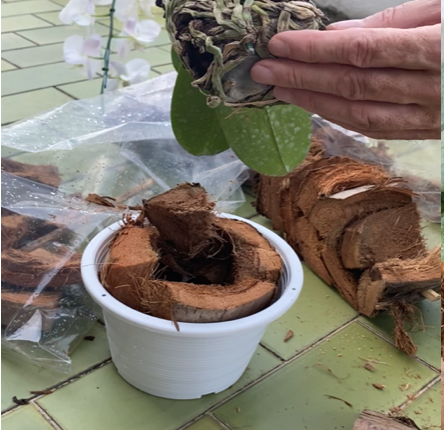
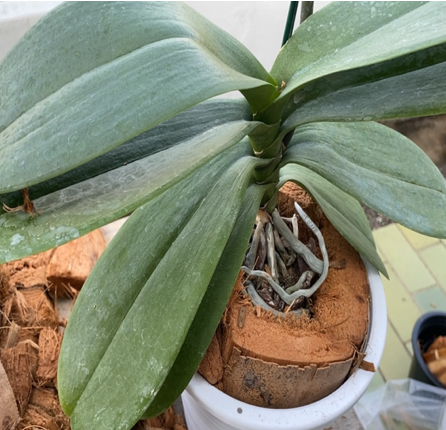
Here's the advantage analysis. The natural unprocessed, organic coconut is made up of 6 sections:
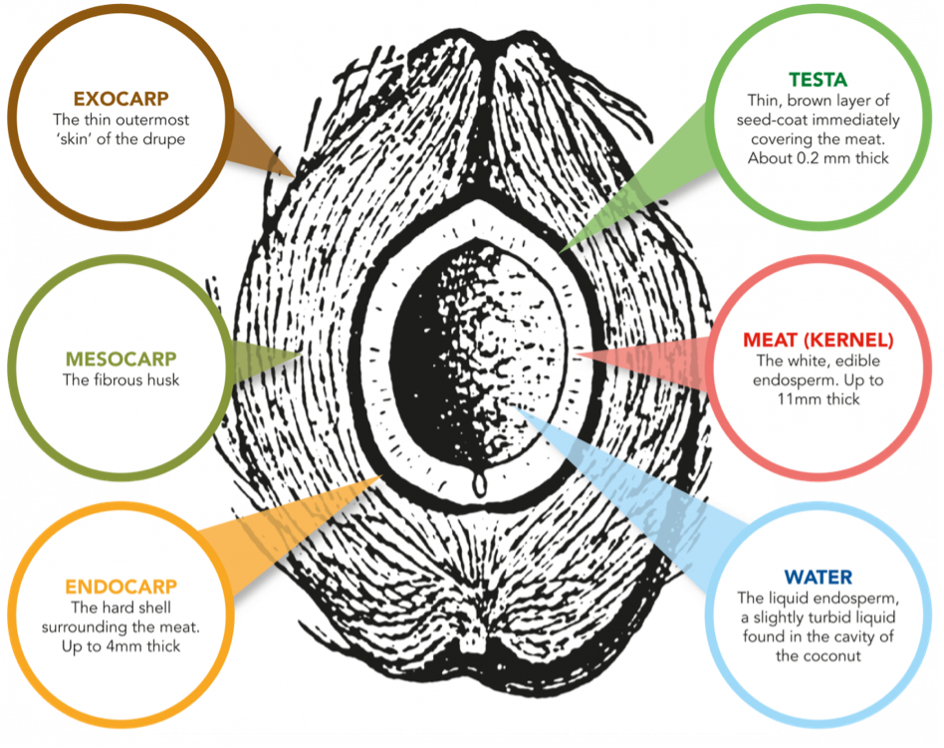
The two subsections that make up the "Raw Pithy coconut husk shells" are the EXOCARP and the MESOCARP. Nature has designed these to project ENDOCARP and the contents of the actual nut. As discussed above, the "Prefab coco coir" is made up of only the processed part of MESOCARP and that soaking process that extracts the fibers, unfortnately diminishes both the beneficial bacteria called "Linqnins", and the organic nutrient densities of potassium, iron , manganese, cooper, and zinc that are naturally found in raw pithy coconut husk shells. The innate time release of the naturally stored bio-supplements and constructive bacteria of the non-processes EXO / MESOCARP over an extended period, catapults the raw pithy coconut husk shell staves to be the undisputed leader of pot liners!
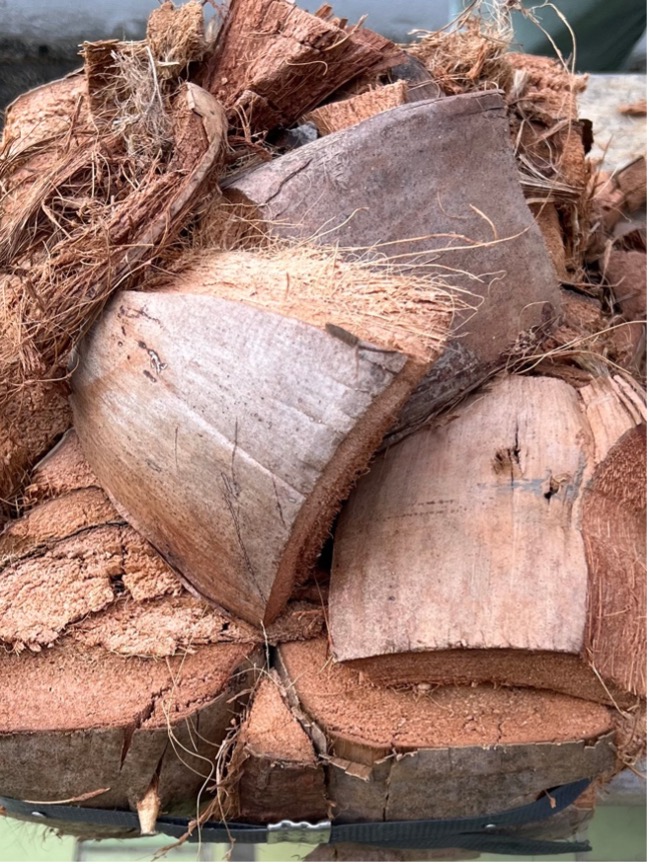
Direct from Thailand, these genuine, unprocessed, coconut coir "pot lining staves", with the attached outer shell, are what the "world renown" Royal Thai gardeners and orchid nurseries have used for centuries as a trade secret insert to the planter pots for every indigenous flora, foliage and orchids that are propagated throughout the Kingdom. Arranging these staves to line your own pots will provide both the absolute natural aesthetic foundation and functionality to your potting handiwork.
Regardless of whatever the potting medium used to nourish any species of plant, lining the pot with these durable raw pithy coconut husk shell staves will greatly improve its health and longevity. These pot liners are not soaked, processed, or industrially treated in any way. Consequently, the raw pithy coconut husk shells enjoy several additional desirable qualities that home gardeners look for including:
Naturally pH Balanced
Certain plants are very sensitive to changes in the pH levels of their soil. Raw pithy coconut husk shells staves have a natural pH range of 5.2 to 6.8, which is nearly neutral on the pH scale, making it ideal for lots of plants without the need for additives.
Nutrient Density
Potassium, iron, manganese, copper, and zinc are naturally found in coconut by products. Lining your pot with raw pithy coconut husk shells staves allows for the slow releases of these bio-stimulant nutrients to feed your plants on an ongoing basis over time.
Beneficial Bacteria
Raw pithy coconut husk shells are naturally high in compounds called lignins. This encourages the development of beneficial bacteria, which makes it less likely for harmful bacteria to invade your plant's root system. This is the primary reason why it's popular amongst hydroponic growers.
Cost Effective

